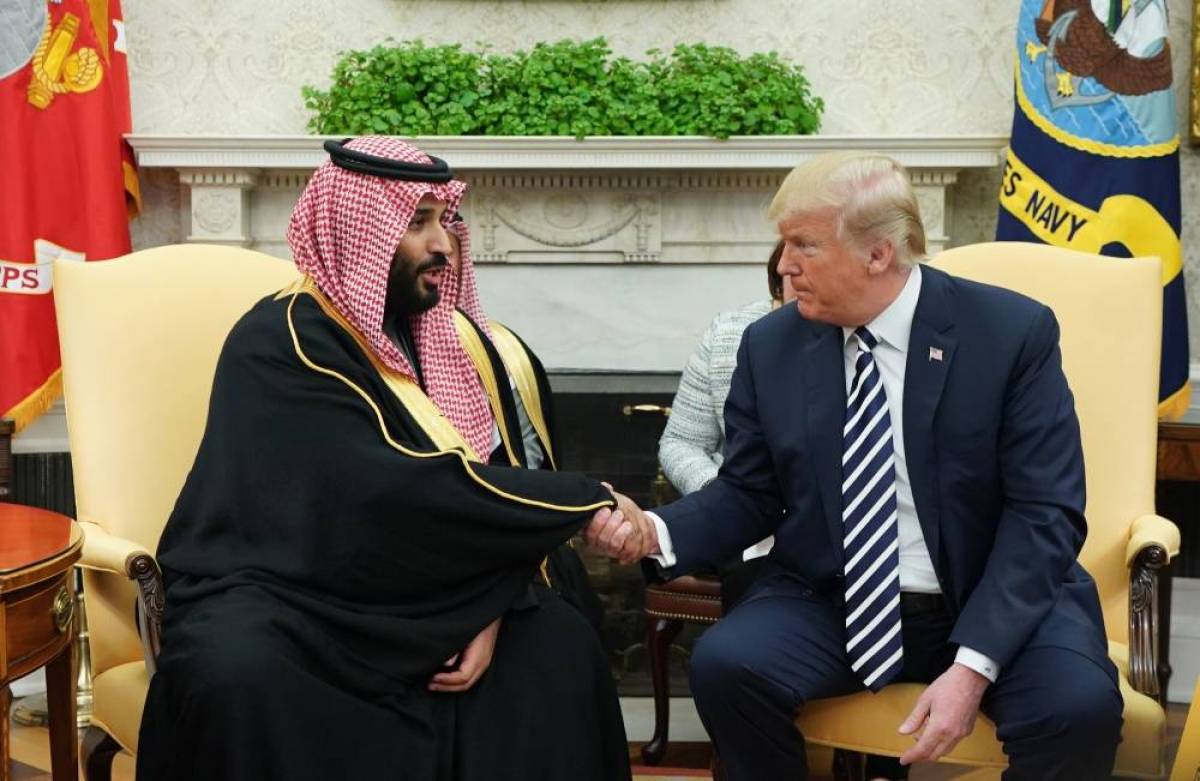Alwaght- Since their establishment, relations of the US and the Persian Gulf Arab states have been based on great privileges to Washington. The Arab rulers have been blackmailed into huge investments in the US, sealing massive arms deals, and giving oil advantages to the Americans in return for political and diplomatic shield by Washington to help them continue their rule.
This issue is sometimes so glaringly apparent that one doubts that the Arab rulers have any independence. Earlier this week, the US President in a rally speech in Maryland to told his supporters that he recently talked on the phone with King Salman of Saudi Arabia and told him that without the US protection, his family rule cannot last for two weeks. The analysts read Trump’s remarks as a fact and indicating the depth of the Arab states’ reliance on the Washington help.
Still, the president’s claim is big and relatively implausible. This article aims to test Trump claim’s veracity with regard to the realities of the Saudi society and the crises the government is grappling with.
Saudi Arabia and erupting crises
Saudi Arabia has a totally non-democratic regime with an extremely strict and closed political structure. A large part of the government income is provided by the oil exports, making it a rentier state with a lack of a sense of a need to respond to the questions of the society. This feature inflicts political legitimacy crisis on the ruling family on the one hand and causes inefficiency crisis inside the governance system, having in mind that the rentier states are on the blink when it comes to extracting the natural resources and fairly distributing them at home. Such a weakness stirs social inequities as the government is pushed to adopting incompetent economic policies.
The legitimacy crisis the ruling family is suffering from is further exposed by increasing social activism demanding cultural and social freedoms among the women and the young generation. As the society breaks up with its traditional tribal structure and moves towards modernization, though at a slow pace, the government increasingly uses repressive measures to contain the pro-reform waves within its favorable lines and also introduces some reforms, albeit in many cases symbolic and superficial.
The inefficiency crisis, prompted by the unfair distribution of resources and wealth, discrimination against the minorities like the Shiites in the east of the country, flagrant government corruption, high inflation and unemployment rates, and the wide gap between the military and social spending, sparked anti-government protests in 2011. The government treated the demonstration with an iron fist. Since then, the government resorted to occasional pay rises of the government employees to steer clear of renewed protests.
With this picture of Saudi Arabian domestic crises, should we believe Trump’s claim that without the foreign help, the government will collapse within a fortnight?
US: the biggest threat
According to a theory on the background of non-democratic regimes’ collapse and the process of transition to democracy, the crisis in four factors leads to fall of the authoritarian regimes: 1. Power tools. 2. Legitimacy. 3. Social services. 4. Guarantee of the interests of the upper class or the class with links to power orbit.
When we look at the police and security forces in Saudi Arabia, we can conclude that the government faces no crisis in using force to launch crackdowns or prevent demonstrations. The repression apparatus still works effectively. With the coordinated and powerful partnership of the judiciary and the security forces, the critics and opposition are incapable of mobilizing the masses for street protests.
On the ruling class, there is not much of a crisis the kingdom is facing. Dismissal of Mohammad bin Nayef and installing Mohammed bin Salman in his place as crown prince and bin Salman’s crackdown on the wealthy businessmen and the royals and extorting part of their wealth led to some dissent among the royals, which many argue is the cause of attack on the king’s residence Al-Khazami Palace in the capital Riyadh in late April. However, the ruling structure in the monarchy is not heavily divided like what happened in Libya, Tunisia, Egypt, and Yemen just on the threshold of their uprisings.
When it comes to the legitimacy, a crisis is observable and is subject to expansion over time amid social changes and rise of a new generation of young people. But for now, the pro-reform forces are not heavyweight enough in the largely tribal, traditional, and religious society of Saudi Arabia to mobilize the people for a social revolution. On the other side, the ideological apparatuses, using the media and the Al Sheikh Wahhabi clergy, propagate the notion that the rulers simply have the duty to secure people and people have to unconditionally obey them.
So, although Saudi Arabia faces growing crises, Trump’s claims do not represent the Saudi realities. This gives the notion that Trump’s remarks during the phone conversation with King Salman represent a threat rather than a fact about the Al Saud crown.
Tracking the record of the Western, and the two colonial powers of the US and Britain, treatment of the regional countries exhibits massive intervention, ranging from military coup to direct military intervention to the assassination of leaders, into the regional affairs.
Therefore, the Trump’s comments are an indirect threatening of the Saudi government. In other words, Trump sent a warning, telling Riyadh leader that if the monarchy does not meet his largely mercantilist demands, White House is capable of dethroning the Al Saud family within a short time and replace them with a new ruling circle. Prince Mohammed’s submission to Trump’s pro-Israeli, anti-Palestinian policies apparently demonstrates this truth. Additionally, the crown prince desperately needs the Washington green light to ascend the throne.



























